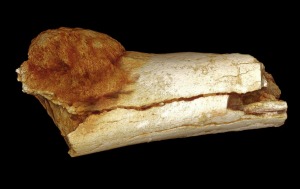A team of international researchers in South Africa have identified the earliest known incidences of cancer in the hominin fossil record. Two research articles in the South African Journal of Science describe a malignant osteosarcoma in a foot bone, dated at around 1.7 million years old, and benign neoplasms at nearly 2 million years old in hominin vertebrae. The malignant neoplasia predates the last evidence of the disease by nearly 200,000 years. While modern habits and lifestyles are responsible for many instances of cancer, it is apparent that the disease has been around for longer than we thought.

These findings by the South African Centre for Excellence in PalaeoSciences and the University of the Witwatersrand’s Evolutionary Studies Institute can change the perceptions of cancer. The ancient tumors were in specimens that clearly do not have the environmental factors of today. One of the researchers, Edward J. Odes, says ” the capacity for malignancy is ancient. We also know that there are mechanisms that bring these tumors and cancers. The question is, how can we apply these mechanisms to understand the evolution of cancer from ancient times into this modern world?”